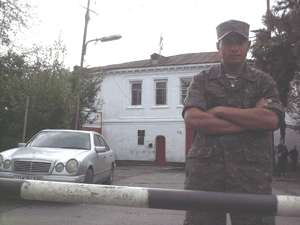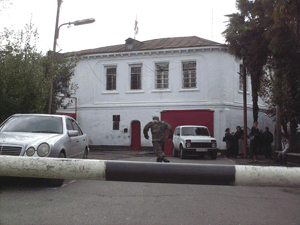 Nana Pazhava, Zugdidi
Nana Pazhava, Zugdidi
8 prisoners from Zugdidi Prison # 4 face extended prison terms for allegedly assaulting the prison administration and for not having followed penitentiary institution employees’ legitimate demands. Some of prisoners are from a group of 8 that have been sentenced to 2 months of pre trial detention and some had already been sentenced on September 30 to additional jail term. The incident which became the reason for charging prisoners occurred on August 11th, 2008. A prison guard together with the prisoners was injured during the incident. It can be considered that all 8 prisoners have become victims of Russian occupation, as the Russian military aggression to Georgia caused panic in Zugdidi Prison #4. After having stated about possible bombing the Georgian Government did not even try to evacuate prisoners from the prison facility in light that the facility could have been bombed.
All 8 prisoners charged for assaulting prison administration and not following the penitentiary institution employees’ legitimate demands consider that they are not guilty as charged. The 8 prisoners were first interrogated as witnesses. However, later they were declared as suspects. Now the prisoners are maintaining their right to remain silent. All 8 deny that they had assaulted the prison administration. The court verdicts were surprising for the prisoners. They were tried under various parts of Article 378 of the Criminal Code of Georgia.
According to investigation materials about 13 prisoners and 10 employees received minor injuries. The investigation materials also say that the many disturbances in prison were caused by the noise coming from cell # 25 when a total of 18 prisoners were attempting to escape. They tore a metal and concrete table away from the floor and tried to use it to open the cell door. The staff demanded that they maintain order. However, the prisoners did not follow the order. After this the prison administration decided to open the cell door and this is the prisoners assaulted the guard.
The investigation did not express any interest as why the prisoners tried to escape. The testimonies of 8 accused and 10 witnesses from the same 25th cell provide contradictions, which is a rather important issue to take into consideration as to the circumstances. Witnesses say that the prisoners had injured themselves.
Dariko Tordia, attorney: “It is absurd, the investigation states that the prisoners assaulted the guard and then injured themselves as they carried out their illegal act. The investigation should first consider why the prisoners tried to escape in the first place and than consider appropriate punishment, if merited. I say it was a case of panic and not a prison uprising. They did not try to escape. On August 11th the head of Parliament of Georgia officially stated that Zugdidi might be bombed by Russian aviation. He actually said goodbye to the inhabitants of Samegrelo Region. The prisoners sitting behind the iron door and bars listened to this statement. As a consequence, they demanded that the prison administration moved them to a safe place. However, their demand was rejected. Under the circumstances what else could be expected? They panicked and tried to get out of the cell, which is only a normal instinct as they were trying to save their lives!”
There is also an unofficial version of the incident: “The noise started at about 1  p.m. in Zugdidi Prison #4 on August 11th when Davit Bakradze, Georgian Parliament speaker finished his statement. Prisoners from various cells started making noise. Initially the prisoners from cell #25 were not among those making noise. However, they joined later. Aapart from other prisoners from cell #25, they did not stop their action upon the demand of the prison guard. Cell # 25 was trying to attract prison administration’s attention. Therefore the administration decided to open the cell door. About 15 men in masks possibly the Special Unit entered the cell and started beaten the prisoners with truncheons.
p.m. in Zugdidi Prison #4 on August 11th when Davit Bakradze, Georgian Parliament speaker finished his statement. Prisoners from various cells started making noise. Initially the prisoners from cell #25 were not among those making noise. However, they joined later. Aapart from other prisoners from cell #25, they did not stop their action upon the demand of the prison guard. Cell # 25 was trying to attract prison administration’s attention. Therefore the administration decided to open the cell door. About 15 men in masks possibly the Special Unit entered the cell and started beaten the prisoners with truncheons.
Dariko Tordia, attorney of prisoner Mamuka Khuntsaria protests against the results of forensic expertise which declared that her client had received but minor injuries.
Dariko Tordia: “I was enabled to meet with my client only after 40 days following the incident. However, even after 40 days the injuries were still vividly seen on his face and body. The injuries have not disappeared even after such a period of time. He has suffered long-term injuries. An injury which is more then 2 cm. long can be observed above an eyebrow up to present time. However, according to forensic analysis this was not considered to have been a serious injury. According to Article 378 of Private Part of the Criminal Code of Georgia, a prisoner who received serious injuries during the uprising will not be charged. This is why the forensic expertise did not say that he was severely injured. We, attorneys do not have right to see into cells. The prisoners could not have broken a very strong door with the table which is fastened to the floor as it is impossible to tear it away from the floor.”
After the statement on possible Russian aggression, the associates of Zugdidi Prison #4 prisoners rushed to the prison. Kakha Khuntsaria, brother of Mamuka Khuntsaria was among them.
Kakha Khurntsaria: “Everyone was extremely panicking in prison. The administration representatives were not wearing uniforms. They did not have guns with them. It seemed that they too were trying to escape the Russians. Their action is quite understandable in light of the invasion. The population was leaving Zugdidi at that moment. The prisoners’ relatives wanted to know what the administration would decide about the evacuation… My brother told me that the prisoners were hiding under beds out of instinct. Those who could shout still shouted. Some others were waiting for the bombing to start in silence. My brother said the prisoners were demanding that they were transported to a safe place. They requested that they were given the chance to fight and to not be allowed to die in their cells. Then the men in masks entered their cell and started beating the prisoners with truncheons. My brother said none of them were wearing uniforms.”
Eduard Kobalia was the first prisoner to be sentenced to 2 months of pre trial detention according to Part I and II of the Article 378 of the Criminal Code of Georgia on August 21st. He had been serving his previous sentence for illegal preservation of a machine gun and would have been freed from the prison in a week.
Levan Uzalashvili and Avtandil Kakachia were last to be sentenced to 2 months of pre trial detention on October 1st. Bacho Kurashvili, attorney states that both prisoners were serving prison sentence for committing serious crimes. Their prison term will be now be prolonged and they face from 10 to 15 years of additional time.
Nana Kakabadze, head of Georgian NGO Former Political Prisoners from Human Rights states that the government had to evacuate the prisoners and to have ensured their security.
Nana Kakabadze: “As the prisoners were facing a serious threat which is admitted by the government itself, the Georgian Government should have first evacuated them. As the government did not do this, the government itself is accountable for the incident. The government should have transported the prisoners to a safe place because these kinds of institutions do not have bomb shelters. In this case no one ensured their security and the prisoners tried to survive the best way they could. Any charges against them should at least be minor. The government must remember that the prisoners’ rights are regulated by the Law of Georgia for Prisoners and they have the right to life according to international conventions. However, the administrations of penitentiary institutions generally treat prisoners ruthlessly.



